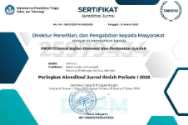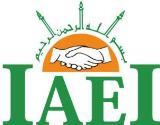A’ang Yusril Musyafa’, O. K. A. (2025). Strategi Pengelolaan Wakaf Produktif Potensi Dan Tantangan Di Indonesia. Jurnal Pro Justicia, 5(1), 43–52.
Ali, Z. Z., Rahmatullah, & Sidqi, I. (2023). Contemporary Issues in Islamic Law, Economics and Finance: A Multidisciplinary Approach. Quantitative Finance, 23(9), 1217–1219. https://doi.org/10.1080/14697688.2023.2200489
Bank Indonesia. (2023). Sinergi Ekonomi Dan Keuangan Syariah Memperkuat Ketahanan Dan Kebangkitan Ekonomi Nasional. In Departemen Ekonomi dan Keuangan Syariah, Bank Indonesia.
Damayanti, A., Sugianto, & Atika. (2023). Analysis Of Implementation Of Psak 112 Concerning Wakaf Accounting At Nazhir Center For Productive Waqf Development Mui, North Sumatra. Journal of Management, Economic, and Accounting, 2(2), 251–258. https://doi.org/10.37676/jmea.v2i2.186
Dewi, K., & Amrizal, A. (2023). Analysis of the Application of Waqf Accounting Standards (PSAK 112). Proceeding Medan International …, 1(January), 675–694.
Fathoni, A., Asasriwarni, A., Yunarti, S., Firdaus, N., & Christoph, N. (2025). Waqf in Malaysia: a Study of Islamic Law and its Implications for Social Development. El-Hekam: Jurnal Studi Keislaman, 10(1), 83. https://doi.org/10.31958/jeh.v10i1.14281
Fauzi, A. (2022). Problematika Pengelolaan Dan Pendayagunaan Wakaf (Studi Di Badan Wakaf Indonesia Perwakilan Provinsi Lampung). Familia; Jurnal Hukum Keluarga, 3(2), 129–150.
Frasser, C., & Guzmán-Castro, G. (2024). The Plurality of Economic Classifications: Toward a New Strategy for Their Investigation. Erasmus Journal for Philosophy and Economics, 17(1), aa. https://doi.org/10.23941/ejpe.v17i1.780
Furqon, A. (2021). Institutional Challenges in Indonesian Waqf Management. International Journal of Islamic and Middle Eastern Finance and Management, 14(2), 234–251.
Haidlir, B. M., Laksmono, B. S., Kasri, R. A., Azizon, A., & Hartono, D. (2021). Public Behaviour on Cash Waqf: Evidence from Indonesia. Jejak: Journal of Economics and Policy, 14(2), 316–332. https://doi.org/10.15294/jejak.v14i2.32032
Hasanah, I. (2020). Menelaah Wakaf Produktif Atas Solusi Masalah Umat Berdasarkan Psak 112. Jurnal Tabarru’: Islamic Banking and Finance, 3(2), 313–325. https://doi.org/10.25299/jtb.2020.vol3(2).5896
Hasanah, U. (2019). The Role of Indonesian Waqf Board in Developing Cash Waqf. Journal of Islamic Monetary Economics and Finance, 5(1), 23–44.
Hatim, A. (2021). Reformasi Peran Badan Wakaf Indonesia (Bwi) Dalam Ekosistem Wakaf Nasional Sebagai Jalan Menuju Reforma Agraria. Rewang Rencang : Jurnal Hukum Lex Generalis, 2(9), 870–888.
Huberman, M. (1992). Analisis Data Kualitatif. Jakarta: Universitas Indonesia Pers.
Huda, M., Santoso, L., & Noviana, L. (2019). Ulama Viewpoints of Corporate Waqf in Southeast Asia.
Hussin, R., & Harun, R. (2023). Examining the Legal Procedures of Waqf Implementation in Higher Education Institutions (HEIs) in Malaysia and Turkey. Environment-Behaviour Proceedings Journal, 8(SI13), 37–44. https://doi.org/10.21834/e-bpj.v8isi13.5036
Indah Sulistya, Neneng Hasanah, M. I. I. (2020). Strategi Pengelolaan Wakaf Uang oleh Badan Wakaf Indonesia (BWI). AL-AWQAF Jurnal Wakaf Dan Ekonomi Islam, 13(1), 39–58.
Indonesia, B. W. (2023). Laporan Tahunan BWI 2023. Jakarta: Badan Wakaf Indonesia.
Indonesia, R. Undang-Undang Nomor 41 Tahun 2004 tentang Wakaf. , (2004).
Jalil, A., & Mohd Ramli, A. (2014). Conceptualisation of corporate waqf. Seminar Waqf Iqlimi 2014, 310–321. Retrieved from http://ddms.usim.edu.my:80/jspui/handle/123456789/9866%0Ahttps://oarep.usim.edu.my/jspui/bitstream/123456789/11590/1/Conceptualisation Of Corporate Waqf.pdf
Kahf, M. (2019). Waqf and Its Sociopolitical Aspects,” in Islamic Economics: Theory and Practice, ed. Habib Ahmed. London: Routledge.
Kasri, N. S., & Ismail, S. F. A. (2021). Social enterprise and waqf: An alternative sustainable vehicle for Islamic social finance. Foundations of a Sustainable Economy: Moral, Ethical and Religious Perspectives, 288–307. https://doi.org/10.5220/0010120802180230
Muhammad Habibi MZ, & Fauzani, L. (2025). DINAMIKA SENGKETA WAKAF DI INDONESIA: Problematika Yuridis, Efektivitas Regulasi, dan Formulasi Model Penyelesaian. Al-Iqtishadiah: Jurnal Hukum Ekonomi Syariah, 6(1), 1–23.
Nasir, F. M. (2021). Revisi UU Kunci Transformasi Wakaf.
Nugraha, A. L., Susilo, A., Huda, M., Athoillah, M. A., & Rochman, C. (2022). Waqf Literacy: The Dynamics of Waqf in Indonesia. Journal of Islamic Economics and Finance Studies, 3(2), 102. https://doi.org/10.47700/jiefes.v3i2.5082
Nur Miftahul Jannah, Nurfala Safitri, & Nilawati. (2025). Wakaf Produktif dalam Paradigma Hukum Ekonomi Syariah: antara Keabadian Harta dan Produktivitas Sosial. Jurnal Intelektualita: Keislaman, Sosial Dan Sains, 14(1), 239–248. https://doi.org/10.19109/intelektualita.v14i1.28009
Rakhmat, A. S., & Beik, I. S. (2022). Pengelolaan Zakat dan Wakaf di Malaysia dan Turki: Studi Komparatif. ILTIZAM Journal of Shariah Economics Research, 6(1), 48–58. https://doi.org/10.30631/iltizam.v6i1.1077
Ramdhan, M. (2021). Metode penelitian. Medan: Cipta Media Nusantara.
Saputri, M. (2024). Transformasi Digital dalam Filantropi Islam: Optimalisasi Pengelolaan Zakat dan Wakaf Melalui Fintech Syariah. SANTRI : Jurnal Ekonomi Dan Keuangan Islam, 2(6), 305–314.
Sidqi, F. A. (2019). Revitalisasi Badan Wakaf Indonesia (BWI): Analisis Kritis UU Nomor 41 Tahun 2004. Al-Adl: Jurnal Hukum, 10(1), 15–32.
Statistik, B. P. (2018). Proyeksi Penduduk Indonesia 2015-2045. Jakarta: Badan Pusat Statistik.
Suharsimi Arikunta. (2023). Kecakapan Nazhir Dalam Pengelolaan Wakaf Produktif Di Indonesia. Ulumuddin: Jurnal Ilmu-Ilmu Keislaman, 13(2), 199–220.
Tasdemir, M. (2015). Governance Regulatory Framework for Waqf in Selected Countries 1 Zurina Shafii 2 Zamir Iqbal 3 Mustafa Tasdemir 4. Tkbb.Org.Tr, 1–41. Retrieved from http://www.tkbb.org.tr/Documents/Yonetmelikler/Governance-Regulatory-Framework-for-Waqf-in-Selected-Countries-Zurina-Shafii-Zamir-Iqbal-Mustafa-Tasdemir-2015.pdf
Teguh, & Yulianto, R. A. (2023). Analisis Yuridis Implementasi Peran Badan Wakaf Indonesia Perspektif Kemanfataan. Veritas, 9(1), 111–127.
Thaker, M. A. M. T., & Thaker, H. M. T. (2015). Exploring the contemporary issues of corporate share waqf model in Malaysia with the reference to the Waqaf An-Nur Corporation Berhad. Jurnal Pengurusan, 45(2015), 165–172.
Wahyudi, F. S., Setiawan, M. A., & Armina, S. H. (2025). Potensi Integrasi Zakat & Wakaf Berbasis Digital untuk Mencapai Tujuan Pembangunan Berkelanjutan (SDGs): Perspektif Maqashid Syariah. Journal of Islamic Economic Studies, 1(3), 235–242. Retrieved from https://www.researchgate.net/publication/395272725%0A
Williamson, O. E. (2000). The New Institutional Economics: Taking Stock, Looking Ahead. Journal of Economic Literature, 38(3), 595–613.
 (Sekolah Tinggi Agama Islam Raudhatul Akmal Deli Serdang)
(Sekolah Tinggi Agama Islam Raudhatul Akmal Deli Serdang) 




.jpg)



